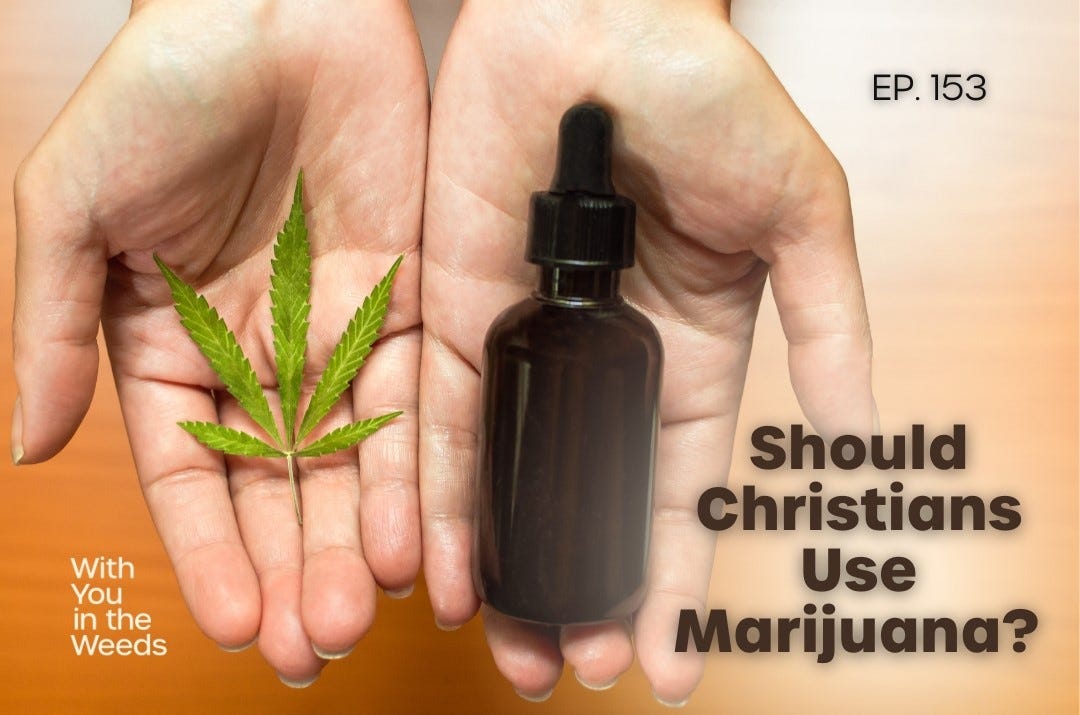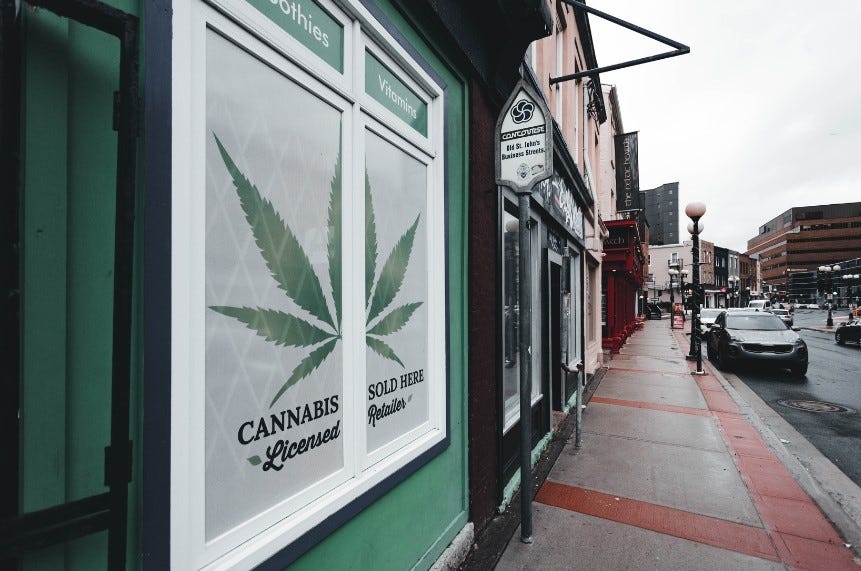Should Christians Use Marijuana?
Getting "in the weeds" about weed
In today’s society, marijuana use is legalized and normalized…but is it wise?
In this next episode of our ongoing series, Dealing with Your Addictions, Austin, John, and Shay sit down for a straightforward conversation about the effects of marijuana and how Christians can make wise decisions in a culture where marijuana use is increasingly common.
You’ll hear about:
The physical and psychological effects of THC and CBD
What the Bible has to say about sober-mindedness and self-control
The difference between medical use and recreational use
Questions you can ask yourself about intentionality and relational effects
Ultimately, marijuana use may be permissible but not necessarily beneficial. The key is intentionality, wisdom, and a desire to honor God in every area of life—not abstaining to earn God’s love but responding to his love with discernment and self-control.
Christians and Cannabis: Asking the Hard Questions
Today’s episode is about whether or not Christians should use marijuana. We think that’s an important question that any Christian who is seeking to follow Jesus needs to be asking. But before we answer that question, we want to look at some information about the physical and psychological effects of marijuana and how it impacts you in your physically, psychologically, and in your relationships and job.
We want to acknowledge the distinction between using it infrequently or casually and having a marijuana addiction. But when it comes to the current status of marijuana in our culture, it’s something that needs to be talked about. It may be legal in many places, but is it beneficial? That’s a place where wisdom is needed.
The 2021 book Cannabis and the Christian: What the Bible Says About Marijuana, by Todd Miles, has some sobering statistics. One in ten young adult men use marijuana daily. 6.6 % of eighth graders use marijuana on a regular basis. 18.4 % of 10th graders use marijuana on a regular basis. And 22.4 % of high school seniors use marijuana regularly. Since this book came out, even more states have legalized the use of marijuana and related products so most likely, those stats are even higher today.
Sales of marijuana products came to $400 million in 2014. Seven years later, in 2021, they equaled $8.7 billion. That’s a 2,000% increase. It’s possible that people have been led to believe that marijuana is harmless, but it’s not. It has many impacts that we're going to look at in this episode.
We’re not experts or doctors, but we are getting our research and insights from people who fall into the expert category. We’re using the book mentioned previously, as well as a podcast by the Huberman Lab called The Effects of Cannabis and notes from David Koch, a professor and addictions expert that we had on our podcast recently.
The Effects and Potency of Modern Marijuana
When talking about the nature of the drug, CBD should be distinguished from THC. Those are two of the most prominent chemical compounds found in the cannabis plant. CBD and other derivatives like CBG and CBN are non-psychoactive and don’t produce a high. They even help improve sleep quality and decrease inflammation. Those are categorically and qualitatively different than the THC.
THC is psychoactive, which is what produces a high. And yet those highs can be notoriously difficult to predict. For some people, there’s a mellowing and calming effect. For others, it’s stimulating. But everyone who gets high has altered perception and impaired judgment. Because of its differing effects, marijuana is classified as a depressant in smaller doses, but a hallucinogen in larger doses due to the psychoactive properties of THC.
Marijuana today is much more potent than it was 30-40 years ago. According to The Marijuana Potency Project, the average concentration of THC in marijuana has soared from 3-4% in the 1990s to 13% today. The most potent strands can be as high as 25% THC. In addition, the amount of CBD has declined, leading to a much higher THC-to-CBD ratio. The increase in potency has public health implications, including increased emergency room visits for marijuana use as well as a significant effect on users, particularly teens.
Marijuana’s Impact on the Brain and Body
Let’s get to the three impacts of marijuana and THC on the brain. First, it thickens the cell walls in the brain up to 300 times the original size. This slows down brain function significantly. It can contribute to a loss of motivation and drive to achieve.
Second, THC decreases firing in the hippocampus which is the part of the brain that’s in charge of memory storage and recall. If you’re regularly using marijuana and you can’t seem to remember events, people, and places, that’s why.
Third, marijuana can alter perception of reality. All of these impacts are significant, but this one stands out the most. About 20 years ago there was a study where pilots were put in flight simulators and had to land a plane five times. The first time they landed the plane, they were sober; the next time they had a little bit of marijuana, and it increased until the fifth time they landed, they had a considerable amount of marijuana in their systems.
Afterwards they asked the pilots, “Which landing did you feel the most confident about?” All of them said the fifth one, when they had the most marijuana in their systems.
But when they ran the numbers through independent flight measures and statistics, the fifth landing was the worst landing for all the pilots. So they thought they did their best, but objectively did the worst. Their perception of reality was off. Like many teenagers with an undeveloped pre-frontal cortex, they were highly confident, but very wrong.
Speaking of teenagers, multiple studies have confirmed that teenagers who use marijuana lose, on average, 8 IQ points that they never gain back in adulthood. We talk about the brain’s plasticity and how skills and knowledge can be increased or regained, and that’s often true, but marijuana cauterizes nerve endings in the brain’s cells and pathways, and they never return. If you’re a parent of a teen who uses marijuana, it’s important to get them help so that they can stop.
Different ways of using marijuana affect the body differently: smoking gives an almost immediate high. That’s because when it’s inhaled, it goes to the bloodstream immediately. Because of the possibility of damage to the heart and lungs, experts are pushing for marijuana to be regulated like tobacco. There’s been an increase in warning labels, education campaigns, and honest discussions between doctors and patients.
Viewing Marijuana Through God’s Word
The most important thing for Christians is to view marijuana through a biblical lens, which helps answer the question about whether or not it’s permissible. There are a couple of verses that shed some light on it, but marijuana isn’t specifically mentioned or prohibited in the Bible.
To start, we must consider what the Bible says about drunkenness. Ephesians 5:18 says, “Do not be drunk on wine, but instead be filled with the spirit.” Almost always, smoking or vaping marijuana leads to an instant high. It’s not a soft start-up. And being high is very similar to being drunk—your inhibitions are lowered, and your judgement is impaired.
However, given the ways you can consume THC in smaller amounts, like in food products and gummies, as well as marijuana derivatives like CBD that are non-psychoactive, the issue of whether it’s right or wrong for Christians isn’t so clear. The ‘drunkenness argument’ doesn’t always apply.
So what becomes important is looking at the reasons why someone uses marijuana. It’s often used when someone is bored or wants to be checked out. But the Bible encourages sober-mindedness and self-control. It’s hard to pray, worship, or witness when you are drunk or high or hungover.
The altered reality of drug use can make people feel that they are so close to God. But when they come off that high, they are disconnected from him. You can’t be connected to God when you’re dissociated from yourself.
You can’t be connected to God when you’re dissociated from yourself.
Marijuana use also affects driving because of slower response times and impaired judgment. If you drive after using marijuana, especially with alcohol, are you really loving your neighbor? If you smoke marijuana regularly, it might not be your intention to have a negative impact on other people. You don’t want that. But despite your desires, there actually are real world impacts that might affect others.
The Bible says not everything that is permissible is beneficial. So marijuana may be legal, but the Apostle Paul wrote to the Corinthians, “All things are lawful for me. But not all things are helpful. All things are lawful for me, but I will not be dominated by anything. I won’t be mastered by anything.” Marijuana is addictive, and we’re not to be mastered by anything except Jesus.
There are definitely times when THC and CBD can be used for chronic pain relief or end-of-life care. If marijuana products are used for medical reasons, like to relieve pain, that’s a really wise use. When you’re in chronic physical pain, you’re diminished as a person. So pain relief is very important to quality of life. But there are also doctors out there that are writing prescriptions and people are using it for recreational use instead of a medical use.
Seeking Clarity by Asking Questions
If you use marijuana, we think the way to have discernment and wisdom about this is to ask yourself some questions. Here are questions that pertain to intention, wisdom, susceptibility to addiction, family and relational impact, and your conscience.
Intentionality & Wisdom
Do you know the potency of the marijuana you’re using?
Is it taking you further than you want to go?
When are you using it and why? For physical pain? To avoid emotional pain? Is it for fun or pleasure?
Does it hinder you from doing your best at your job?
Is it negatively affecting your body and brain?
Susceptibility to Addiction
Are you prone to addiction?
Do you have an addictive personality?
Are you vulnerable to psychosis (extreme anxiety, paranoia, panic attacks, hallucinations, and inappropriate behavior) that could be increased by marijuana use?
Family & Relational Impact
Is the usage of it causing harm to your relationships?
Does it offend your husband or wife?
Does it keep you from being present with your children?
Do your friends or family see a difference in you when you use it?
Your Conscience
What does God think about your marijuana use?
Does it get in the way of your relationship with Jesus?
Does it bring glory to God?
You are a beloved child of God. If you ask yourself these questions and realize you need to make changes, don’t do it so that God will love you more. He can’t love you more than he already does! If you make a change, do it because of how Jesus already sees you and what he wants from you. Change because he loves you and wants you to be healthy and whole, not so he will love you.
There might not be a ‘hard and fast’ answer about whether or not Christians should use marijuana. If it’s legal, perhaps it’s permissible, as long as you’re not getting high. And it should only be used with intentionality, wisdom, and seeking God’s will in order to bring glory to him.
Recommended Resources:
Cannabis and the Christian: What the Bible Says About Marijuana by Todd Miles
The Effects of Cannabis (Marijuana) on the Brain and Body from Huberman Lab




